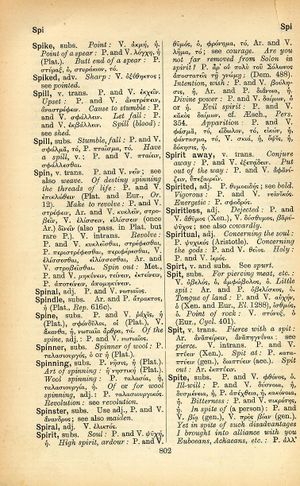gentleman: Difference between revisions
From LSJ
οὐ δικαίως θάνατον ἔχθουσιν βροτοί, ὅσπερ μέγιστον ῥῦμα τῶν πολλῶν κακῶν → unjustly men hate death, which is the greatest defence against their many ills | men are not right in hating death, which is the greatest succour from our many ills
m (Text replacement - "<b class="b2">and</b>" to "and") |
m (Woodhouse1 replacement) |
||
| Line 1: | Line 1: | ||
{{Woodhouse1 | {{Woodhouse1 | ||
|Text=[[File:woodhouse_802.jpg|thumb|link={{filepath:woodhouse_357.jpg}}]] | |Text=[[File:woodhouse_802.jpg|thumb|link={{filepath:woodhouse_357.jpg}}]] | ||
Use Ar. and P. [[καλός]] | ===substantive=== | ||
Use [[Aristophanes|Ar.]] and [[prose|P.]] [[καλός κἀγαθός]], [[Aristophanes|Ar.]] [[καλός τε κἀγαθός]]. | |||
[[well-born]]: use adj. [[prose|P.]] and [[verse|V.]] [[γενναῖος]], [[εὐγενής]] ([[Plato]] and [[Thucydides|Thuc.]]), [[Aristophanes|Ar.]] and [[verse|V.]] [[ἐσθλός]]. | |||
[[your master's a gentleman]]: [[Aristophanes|Ar.]] [[γεννάδας ἀνήρ]], [[ὁ δεσπότης σου]] (''[[Ranae]]'' 738). | |||
}} | }} | ||
Revision as of 08:53, 20 May 2020
English > Greek (Woodhouse)
substantive
Use Ar. and P. καλός κἀγαθός, Ar. καλός τε κἀγαθός.
well-born: use adj. P. and V. γενναῖος, εὐγενής (Plato and Thuc.), Ar. and V. ἐσθλός.
your master's a gentleman: Ar. γεννάδας ἀνήρ, ὁ δεσπότης σου (Ranae 738).

